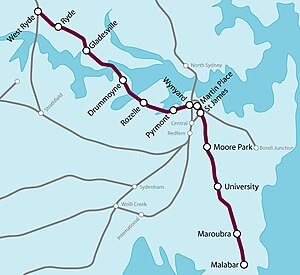Anzac railway line: Difference between revisions
No edit summary |
|||
| Line 90: | Line 90: | ||
| date = 2007-09-19 |
| date = 2007-09-19 |
||
| url = http://www.theglebe.com.au/article/2007/09/19/1859_news.html}}</ref> |
| url = http://www.theglebe.com.au/article/2007/09/19/1859_news.html}}</ref> |
||
| ⚫ | |||
| ⚫ | |||
*[[Proposed railways in Sydney]] |
|||
==References== |
==References== |
||
| Line 95: | Line 99: | ||
<references/> |
<references/> |
||
</div> |
</div> |
||
| ⚫ | |||
| ⚫ | |||
{{List of public transport infrastructure in Sydney}} |
{{List of public transport infrastructure in Sydney}} |
||
Revision as of 01:40, 28 October 2008
Template:Future australian public transportation
Template:Public transport infrastructure in Sydney

The Anzac Line was a proposed metro railway line connecting the City of Ryde and inner west of Sydney, Australia with the eastern suburbs. Officially, the line was simply an option being "actively explored by the government." On 18 March, 2008, the line was integrated as part of the North West Metro and the future South East Metro. The project was expected to take around 10 to 15 years to complete.[1] The line was announced in September 2007 alongside plans to postpone construction of an underground link between Redfern and Chatswood. The name is derived from one of the roads under which the line would run, Anzac Parade.
The line would operate as a metro, with frequent-running, high-capacity, single-deck trains. This would mean that services using the line would operate separately from the rest of the metropolitan rail network, CityRail, which is a commuter rail system using double-deck carriages. The line would cut citybound journey times from Drummoyne and Maroubra travel by as much as one third.[2]
Proposed alignment
The line would be in tunnel, starting at West Ryde station on the Northern Line and travelling beneath Victoria Road through Ryde, Gladesville, Drummoyne, Rozelle and Pyrmont . The line would then pass through existing city stations at Wynyard, Martin Place and St James, before heading south beneath Anzac Parade to Moore Park, the University of New South Wales in Kensington, Maroubra Junction and Malabar.
According to the proposal, stations would be located at:[3]
- West Ryde Station (interchange)
- Top Ryde
- Gladesville
- Hunters Hill
- Drummoyne
- Balmain
- Glebe Island, New South Wales
- Pyrmont
- Wynyard Station (interchange)
- Martin Place Station (interchange)
- St James Station (interchange)
- Taylor Square
- Paddington
- Fox Studios (Fox Studios is located in the suburb of Moore Park)
- Randwick Racecourse (in the suburb of Randwick)
- UNSW (located in the suburb of Kensington)
- Kingsford
- Maroubra
- Maroubra Junction
- Malabar
History
The line follows the alignment of former tram lines connecting Ryde and La Perouse to the city. Plans for an Eastern Suburbs line, drawn up in 1967, included stations at the University and Anzac Parade, Kingsford. A review of the project completed in 1976 determined that the line should instead terminate at Bondi Junction.
The idea resurfaced as part of Ron Christie's 2001 Long-term Strategic Plan for Rail. A map included in the report shows a "River Metro" line starting at Sydenham and connecting Mascot, Eastlakes, Kingsford, the University of New South Wales, Randwick Racecourse, the then Fox Studios, Paddington and Taylor Square with the city at St James. From there the line progresses to Chifley Square and Wynyard; then on to Pyrmont, Glebe Island, Balmain, Drummoyne, Hunters Hill, Gladesville, Ryde, West Ryde, Ermington, Silverwater Road, Rydalmere, Camellia and Parramatta.[4]
Tram operator Metro Light Rail has also proposed reopening part of the Anzac Parade tramway route.[citation needed]
Reactions
Although the planned expansion of the rail network was welcomed, the announcement aroused a degree of cynicism in the media. The Sydney Morning Herald recalled that the government's "now-you-see-it, now-you-don't approach to transport planning has dangled before our eyes, then made to vanish, the Parramatta-Epping railway, the Hurstville-Strathfield railway, the Bondi Beach railway, the new Spit Bridge, and the entire northern beaches railway." For the Herald, "with this Government there is no reason to be confident that anything at all will come of either plan."[5]
The Western Sydney Regional Organisation of Councils was critical of the plan on equity grounds, claiming that "Families in the fast-growing suburbs of Western Sydney need new train lines a good deal more urgently than residents of wealthy established suburbs such as Hunters Hill and Balmain which already have plenty of public transport."[6] Leichhardt Council was, by contrast, positive about the proposal.[7]
See also
References
- ^ "Council can see an end to gridlock", The Glebe, 2007-09-19
{{citation}}: CS1 maint: date and year (link) - ^ Besser, Linton (2007-09-14), "New east-west line may cut congestion", The Sydney Morning Herald
{{citation}}: CS1 maint: date and year (link) - ^ Besser, Linton, "Going underground", Sydney Morning Herald, 14 September, 2007, p. 1.
- ^ Christie, Ron (June 2001), Long-term Strategic Plan for Rail: Greater Sydney metropolitan region
{{citation}}: CS1 maint: date and year (link) - ^ "The ghost at the end of the tunnel", The Sydney Morning Herald, 2007-09-17
{{citation}}: CS1 maint: date and year (link) - ^ "West needs missing link", Penrith Press, 2007-09-20
{{citation}}: CS1 maint: date and year (link) - ^ "Council can see an end to gridlock", The Glebe, 2007-09-19
{{citation}}: CS1 maint: date and year (link)
